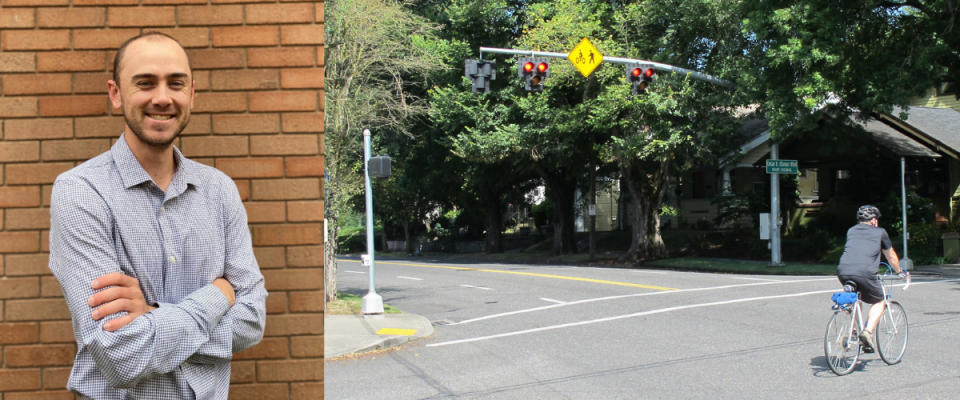Meet the 2023 NITC Student of the Year: Justin Delgado, University of Utah

We're proud to announce our 2023 Outstanding Student of the Year, Justin Delgado of the University of Utah. This award is presented during the Council of University Transportation Centers (CUTC) banquet at each annual meeting of the Transportation Research Board, where the U.S. Department of Transportation honors an outstanding graduate student from each UTC. Justin Delgado will be presented with the award for NITC at this year's CUTC award ceremony. See past NITC Students of the Year.
Justin Delgado, University of Utah
Justin Delgado is a master’s student in the City and Metropolitan Planning Department at the University of Utah. He has been selected as the 2023 NITC Student of the Year and will be presented with the award at the Council of University Transportation Centers banquet at the annual meeting of the Transportation Research Board in January 2023. Justin’s interest in transportation began through his negative personal experiences as a pedestrian and cyclist. His recognition of the inequitable distribution of safe infrastructure between mobility types led him to advocate for the right to travel safely for all types of mobility. Justin currently works as a dual Graduate Assistant for the Physical Enterprise Planning and Development Office (formerly PDC) and the Active Transportation branch of the Sustainability Office at the University of Utah. Justin also actively serves as president of the Urbanists at the University of Utah, Utah’s only nationally recognized planning student group.
Connect with Justin on LinkedIn
Tell us about yourself?
I received my B.S. degree from California Polytechnic University Humboldt in Environmental Science and Management (planning and policy emphasis) and worked as both and intern and staff planner at a local consulting firm, SHN Engineers & Geologists Inc. I left that position to attend graduate school at the University of Utah, where I study City and Metropolitan Planning (Smart Growth, Land Use, and Transportation emphasis). I currently work as a dual Graduate Assistant for the Physical Enterprise and Planning and Development Office (formerly PDC) and the Active Transportation branch of the Sustainability Office at the University of Utah. I also actively serve as president of the Urbanists at the University of Utah, Utah’s only nationally recognized planning student group. Last summer, I was an intern in the Fehr and Peers Irvine office, supporting transportation projects across California. I left that internship to attend a study abroad program through the University of Oregon. This program took me to Denmark, Sweden, and the Netherlands to study their cycling infrastructure development and design. I spend most of my free time in the outdoors, riding my bike, camping, and hiking.
What (or who) has influenced your career path in transportation?
I attended Cal Poly Humboldt with the intention of getting my undergraduate degree to support my lifelong goal of working in the National Parks Service or Forest Service. For much of my life, I have not accessed places of education via car. As both a pedestrian and cyclist, I had the all too common experience of being hit by a vehicle. While working as an instructor and then the eventual Director of the University’s Bicycle Learning Center, I interacted with students who experienced the same thing. It was at this period of my life that my planning courses and experiences merged, and I began to consider how transportation system design played a direct role in everyone’s lives. As I began to explore the concept more, I found the readings from academics like Donald Shoup and Reid Ewing that presented different takes on how transportation infrastructure shapes the way our cities look and function. This solidified my interest in the field of transportation and illuminated the vast role transportation plays in everyone’s daily lives.
Tell us about the research you're currently working on?
I am not actively involved in academic research projects, rather, my role is to create and support opportunities for research to occur. A couple of my active projects include finalizing a contract for a $50,00 research grant from the University’s micro-mobility provider to study its use, demand management, and origin/destination trends, and establishing the University’s first active transportation count program, which includes both permanent and mobile count infrastructure. One project will fund the research project, and the other will likely provide a portion of the data used for that research. Professionally, I am involved in drafting University active transportation design guidelines, and the creation of a new campus shuttle route, both of which involve extensive literature, existing examples, and best practice research and review.
After graduation, what future work do you envision doing in transportation?
I graduate from the University of Utah in May of 2024. After this, my options are wide open. I am beginning to look at job opportunities in the Pacific Northwest and Intermountain West. I am looking at both private and public positions, in communities/companies that are challenging historical practices and working to better the lives of the citizens and clients they serve. I am encouraged by the work done by a lot of transportation entities in the region and look forward to directly contributing to the equitable improvement of our transportation system.
The National Institute for Transportation and Communities (NITC) is one of seven U.S. Department of Transportation national university transportation centers. NITC is a program of the Transportation Research and Education Center (TREC) at Portland State University. This PSU-led research partnership also includes the Oregon Institute of Technology, University of Arizona, University of Oregon, University of Texas at Arlington and University of Utah. We pursue our theme — improving mobility of people and goods to build strong communities — through research, education and technology transfer.
